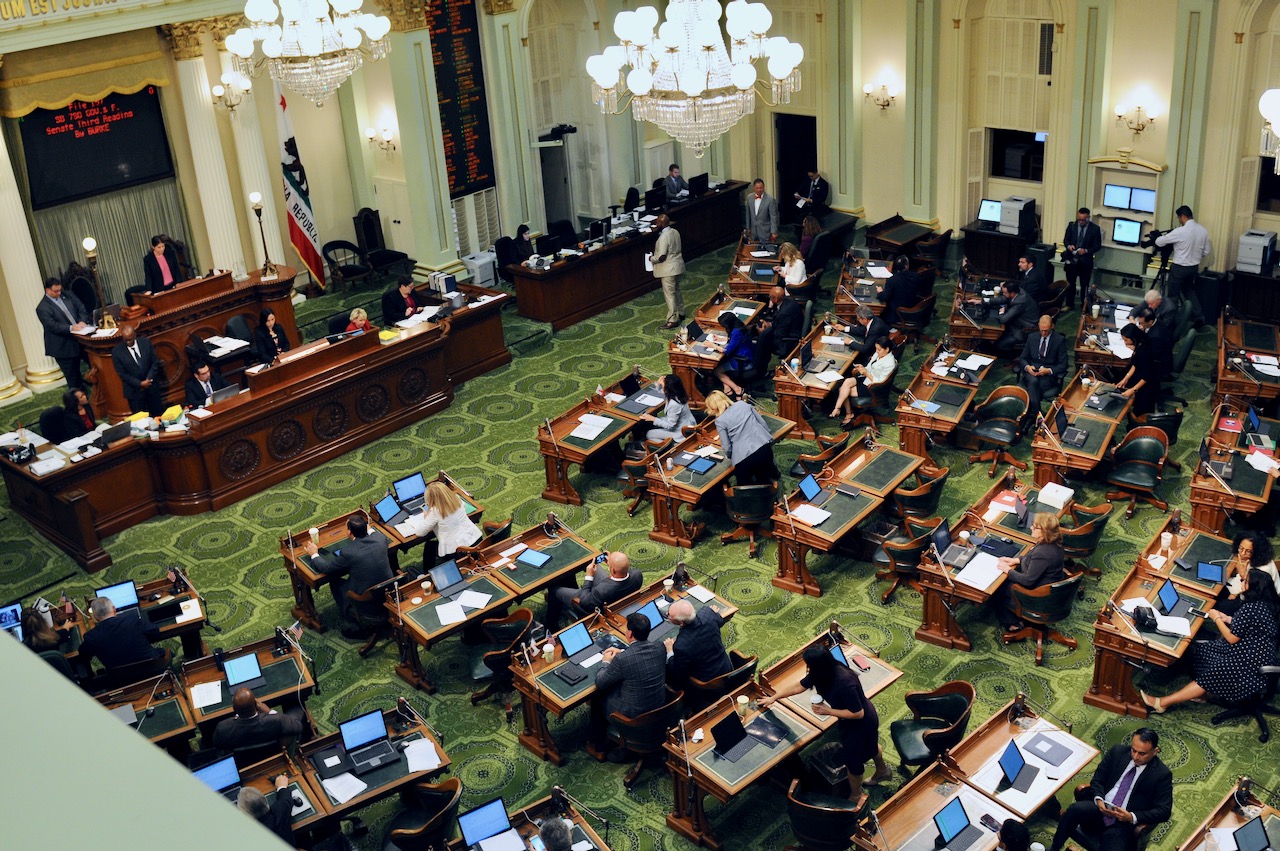
California State Assembly Chamber. (Photo: Kevin Sanders for California Globe)
California’s Legislative Committee System – Part Two
By Chris Micheli, January 29, 2020 6:30 am
This is Part ll of California’s Legislative Committee System; Part l is HERE.
Legislative Committees and Their Jurisdictions
Both houses of the California Legislature provide committees of legislators, based upon subject matter jurisdiction, to handle the business of the respective houses. With fewer legislators, the Senate has a fewer number of committees than the Assembly. Nonetheless, they both consider legislation from their house of origin, as well as the other house. This article provides an overview of the Senate and Assembly standing committees and their basic jurisdictions.
SENATE
There are 21 standing committees in the Senate pursuant to Rule 12 of the Standing Rules of the Senate. Those committees and their subject matter jurisdictions are as follows:
Agriculture — Bills relating to agriculture.
Appropriations — Bills that are subject to Joint Rule 10.5 and are not referred to the Committee on Budget and Fiscal Review. Bills that constitute a state-mandated local program.
Budget and Fiscal Review — The Budget Bill and bills implementing the Budget. Bills that directly affect the State Budget, including deficiencies and reappropriations.
Business, Professions and Economic Development — Bills relating to business and professional practices, licensing, and regulations. Bills relating to economic development, commerce, and international trade.
Education — Bills relating to education, higher education, and related programs. Bills relating to education employee issues and collective bargaining.
Elections and Constitutional Amendments — Bills relating to elections and constitutional amendments, ballot measures, the Political Reform Act of 1974, and elected officials.
Energy, Utilities and Communications — Bills relating to public utilities and carriers, energy companies, alternative energy development and conservation, and communications development and technology.
Environmental Quality — Bills relating to environmental quality, environmental health, air quality, water quality, waste management, recycling, toxics, and hazardous materials and waste.
Governance and Finance — Bills relating to local government procedure, administration, and organization. Bills relating to land use. Bills relating to state and local revenues, bonds, and taxation.
Governmental Organization — Bills relating to horse racing, public gaming, and alcoholic beverages. Bills relating to the management of public safety emergencies and disaster response. Bills relating to state government organization and bills regarding the use of state-controlled lands and buildings, state contracting, and interstate compacts.
Health — Bills relating to public health, alcohol and drug use, mental health, health insurance, managed care, long-term care, and related institutions.
Human Services — Bills relating to welfare, social services and support, and related institutions.
Insurance, Banking and Financial Institutions — Bills relating to insurance, indemnity, surety, warranty agreements, financial institutions, lending, and corporations.
Judiciary — Bills amending the Civil Code, Code of Civil Procedure, Evidence Code, Family Code, and Probate Code. Bills relating to courts, judges, and court personnel. Bills relating to liens, claims, and unclaimed property. Bills relating to privacy and consumer protection.
Labor and Industrial Relations — Bills relating to labor, industrial safety, unemployment, workers’ compensation and insurance, and noncertificated public school employees.
Natural Resources and Water — Bills relating to conservation and the management of public resources, fish and wildlife, regulation of oil, mining, geothermal development, wetlands and lakes, global atmospheric effects, ocean and bay pollution, coastal resources, forestry practices, recreation, parks, and historical resources. Bills relating to water supply management.
Public Employment and Retirement — Bills relating to state and local public agency collective bargaining; state and local non-school public employees; classified public school employees; public retirement systems; public employees’ compensation and employment benefits, including retirement and health care; and state social security administration.
Public Safety — Bills amending the Evidence Code, relating to criminal procedure; the Penal Code; and statutes of a penal nature. Bills relating to the Department of Corrections and Rehabilitation and the Board of State and Community Corrections.
Rules — Proposed amendments to the rules and other matters relating to the business of the Legislature.
Transportation and Housing — Bills relating to the operation, safety, equipment, transfer of ownership, licensing, and registration of vehicles, aircraft, and vessels. Bills relating to the Department of Transportation and the Department of Motor Vehicles. Bills relating to highways, public transportation systems, and airports. Bills relating to housing and community redevelopment.
Veterans Affairs — Bills relating to veterans, military affairs, and armories. Bills amending the Military and Veterans Code.
ASSEMBLY
There are 32 standing committees in the Assembly pursuant to Rule 11 of the Standing Rules of the Assembly. Those committees and their subject matter jurisdictions are as follows:
Accountability and Administrative Review — Primary jurisdictions are identifying efficiencies in the management of state government, reviewing and studying the implementation, operation, and effectiveness of state programs and agencies.
Aging and Long-Term Care — Primary jurisdiction includes area agencies on aging, California Department of Aging, long-term supports and services, Older Americans Act, Older Californians Act, senior citizen advocacy activities, the California Senior Legislature, services for seniors in residential and day settings and the California Commission on Aging.
Agriculture — Primary jurisdiction includes agriculture, agricultural chemicals, agricultural commodities and commissions, Department of Food and Agriculture, expositions and fairs, food labeling, labeling of agricultural commodities, livestock and poultry, marketing law, milk and milk products, pest management, and veterinary issues relative to agriculture.
Appropriations — Primary jurisdiction is fiscal bills, including bonds and alternative public financing.
Arts, Entertainment, Sports, Tourism, and Internet Media — Primary jurisdictions are programs and policies affecting the recording, motion picture and other entertainment industries, tourism and arts programs and museums, professional and amateur sports including the State Athletic Commission and the regulation of athlete agents, and Internet media.
Banking and Finance — Primary jurisdictions are Financial Institutions, Real Property Finance, Consumer Finance, and Corporate Securities Law.
Budget — The Budget Committee’s jurisdiction is the Budget.
Business and Professions – Bills involving “Sunrise,” the creation of new regulatory entities within the Department of Consumer Affairs (DCA); “Sunset,” the oversight and elimination of regulatory entities within the DCA; Health care professional licensing; Veterinarian licensing; Occupational licensing; Vocational education; The Department of General Services (building standards); Product labeling (except agricultural and medical product labeling)
Communications and Conveyance – Primary jurisdiction over cable, common carriers, moving companies, broadband, telecommunications, and transportation network companies.
Education — Primary jurisdictions are education generally, certificated employees of schools, school finance, and school facilities.
Elections and Redistricting — Primary jurisdictions are elections and redistricting.
Environmental Safety and Toxic Materials — Primary jurisdictions are toxic substances and hazardous materials, hazardous waste regulation, drinking water regulation, and pesticides.
Governmental Organization — Primary jurisdictions include alcohol, Indian gaming, horseracing, gambling, tobacco, public records, open meetings laws, state holidays, outdoor advertising and emergency services/natural disasters (this can be shared with the Housing and Community Development Committee and Local Government Committee).
Health — Primary jurisdictions are health care, health insurance, Medi-Cal and other public health care programs, mental health licensing of health and health-related professionals, and long-term health care facilities.
Higher Education — Primary jurisdictions are university, state university, and community college systems, postsecondary education, and student financial aid.
Housing and Community Development — Primary jurisdictions are building standards, common interest developments, eminent domain, farm worker housing, homeless programs, housing discrimination, housing finance (including redevelopment), housing, natural disaster assistance and preparedness, land use planning, mobile homes/manufactured housing, redevelopment: housing, and rent control.
Human Services — Includes child welfare services, foster care, child care, adoption assistance, CalWORKs, CalFresh, developmental disability services, In-home Supportive Services (IHSS), community care licensing, adult protective services, and SSI/SSP.
Insurance — Primary jurisdictions are insurance (excluding health insurance), workers compensation, and unemployment compensation.
Jobs, Economic Development, and the Economy — Primary jurisdictions are business advocacy within California and the United States; business advocacy of import/export trade; California-Mexico relations; California overseas trade offices; Governor’s Office of Business and Economic Development; development and expansion of new technologies, except energy; development of international high tech markets; economic disaster relief; economic impact reports; effect of balance of trade issues on California; expansion of overseas markets; foreign investments by California; foreign investments in California; impacts of federal budget on high tech projects; impacts of federal budget on international trade; industrial innovation and research; international capital, including capital formation; international trade, research and import/export finance; interstate commerce; seaports and physical infrastructure; sister state agreements and friendship agreements with other nations; small business development and operations; state and local economic development; women and minority business enterprises (WBME).
Judiciary — Primary jurisdictions are family law, product liability, tort liability, Civil Code, and Evidence Code (excluding criminal procedure).
Labor and Employment — Primary jurisdictions are wages, hours, employment discrimination, Cal-OSHA, employment development, and public job programs.
Local Government — Primary jurisdictions are General Plan, land use, housing element, local agency formation commissions (LAFCO), city and county organization and powers, special district governance and finance, special taxes, Subdivision Map Act, Brown Act, Public Records Act, redevelopment (as it relates to governance and financing), infrastructure financing districts, local government finance, charter cities and counties, eminent domain, joint powers authorities, Williamson Act, design-build (for local governments), military base reuse, public private partnerships (for local governments), state mandates, county clerks/ recorders, and civil grand juries.
Natural Resources — Primary jurisdiction includes air quality, climate change, energy efficiency, renewable energy, California Environmental Quality Act (CEQA), coastal protection, forestry, land conservation, oil spills, solid waste and recycling.
Privacy and Consumer Protection – Jurisdiction spans a wide range of technology-related issues, and includes matters affecting consumer protection in both the digital and analog worlds. Specifically, the Committee has jurisdiction over matters related to privacy, the protection of personal information (including digital information), the security of data, and information technology, as well as false advertising, charitable solicitations, weights and measures, and consumer protection generally. The Committee is also responsible for oversight of the Department of Technology within the State’s Government Operations Agency.
Public Employees, Retirement, and Social Security — Primary jurisdiction is oversight of Classified school employees, Judges Retirement Law, Public employee collective bargaining, and Public retirement administration and investment strategy.
Public Safety — Primary jurisdiction is the California Penal Code.
Revenue and Taxation — Primary jurisdiction is the Revenue and Taxation Code.
Rules — Primary jurisdictions are proposed amendments to the rules, and other matters relating to the business of the Legislature.
Transportation – Jurisdiction includes California High-Speed Rail Authority, California Highway Patrol, California Transportation Commission, Department of Motor Vehicles, Department of Transportation (Caltrans), driver’s licenses, freight, regional transportation agencies, transit authorities, intercity rail, mobile sources of air pollution, fuels, rules of the road, state highways, local streets and roads, vehicles, aircraft, bicycle and pedestrian facilities, and vessels.
Utilities and Energy — Primary jurisdictions are California Energy Commission; California Independent System Operator; California Public Utilities Commission (CPUC); CPUC oversight and reform; Electric generation: biogas, biomass, coal, geothermal, hydroelectric, natural gas, nuclear, renewables, solar, and wind; Electric grid; Energy efficiency, energy conservation, and demand response; Energy service providers; Natural Gas; Power plant siting; Railroads; Supplier diversity related to CPUC regulated energy, water, and railroad; Utility rates: electric, gas, water, and vessels; Water utilities.
Veterans Affairs — Primary jurisdictions are Cal-Vet loan program, Department of Veterans Affairs, National Guard, State military, and Veterans.
Water, Parks, and Wildlife — Primary jurisdictions are water resources, flood management, fish and game, parks and recreation, and wildlife.
The Importance of Legislative Committee Staff
The policy and fiscal committees of the Assembly and Senate have committee consultants and secretaries (Assembly) or assistants (Senate). The committees are where the major work of the California Legislature gets done each day and so the role of the committee staff is critical to the main legislative function of lawmaking.
The secretaries/assistants process all bills and amendments, log letters received, record votes, and file all reports about committee actions. The consultants prepare analyses for all bills and amendments, both for the committee hearing and consideration of bills on the floors. While the committee staff ostensibly work for the committee members, they take their direction from the chair and, ultimately, the Assembly Speaker or Senate President pro Tempore.
The committee consultants are considered experts in the subject matters under the jurisdiction of their committees. Their analyses are relied upon by legislators and staff in order to cast an educated vote on bills. These consultants also provide legislative history and intent for practitioners and courts in applying and interpreting those bills adopted into law.
In their role, the committee consultants must meet with executive branch staff, lobbyists and interested parties regarding legislation to be heard by their committee. They draft bills and amendments and are often responsible for their chair’s own legislation in that committee’s subject matter jurisdiction. Those analyses serve the critical purpose of educating legislators, staff and the public about existing law and what the bill proposes to change, add or repeal.
The consultants also conduct research and assist committee members with their legislation pending before the particular committee. There is at least one consultant assigned to each committee, but most have at least two and some have more than half a dozen staff positions. The staffing is naturally based upon the volume of work that the committee must handle each year.
These professional staff members are critical to the legislative process in that they prepare the committee and floor analyses that are used by legislators to determine how they will vote on legislation. These analyses are also given considerable weight in determining legislative intent by practitioners and the courts.
Although committee consultants generally write non-partisan bill analyses, everyone has a point of view and sometimes the analyses are written in a manner that may be viewed as weighted more on one side than the other. As such, the bill analysis can play a crucial role in the outcome of legislation. It must be timely and accurate and address the statements of both proponents and opponents of the bill.
In addition, in both the Assembly and Senate, the majority and minority caucuses employ partisan consultants who prepare analyses of all legislation, participate in policy development, legislative research, monitoring and staffing, and assisting with members’ public information programs. In addition, these consultants work closely with legislators’ district offices and keep abreast of political party issues.
Regardless of house, party or committee affiliation, all employees of the Legislature serve at the pleasure of their appointing body. Every employee has to complete an ethics course in the first six months of his or her employment. Thereafter, every employee takes the course in the first six months of every legislative session.
The committee consultants rarely depart their positions, as opposed to staff to individual legislators. It has long been recognized by legislative leaders that continuity and expertise should remain with the policy and fiscal committees. As such, most of them serve for many years in these important roles.
That ensures that their experience and insights can remain with the institution and future legislators and their staff can rely upon and benefit from the committee staff to ensure that the lawmaking process continues without interruption.
- Proration of Estate Taxes - February 28, 2026
- Corporations Commissioner Powers - February 27, 2026
- Death Deeds in California - February 27, 2026




